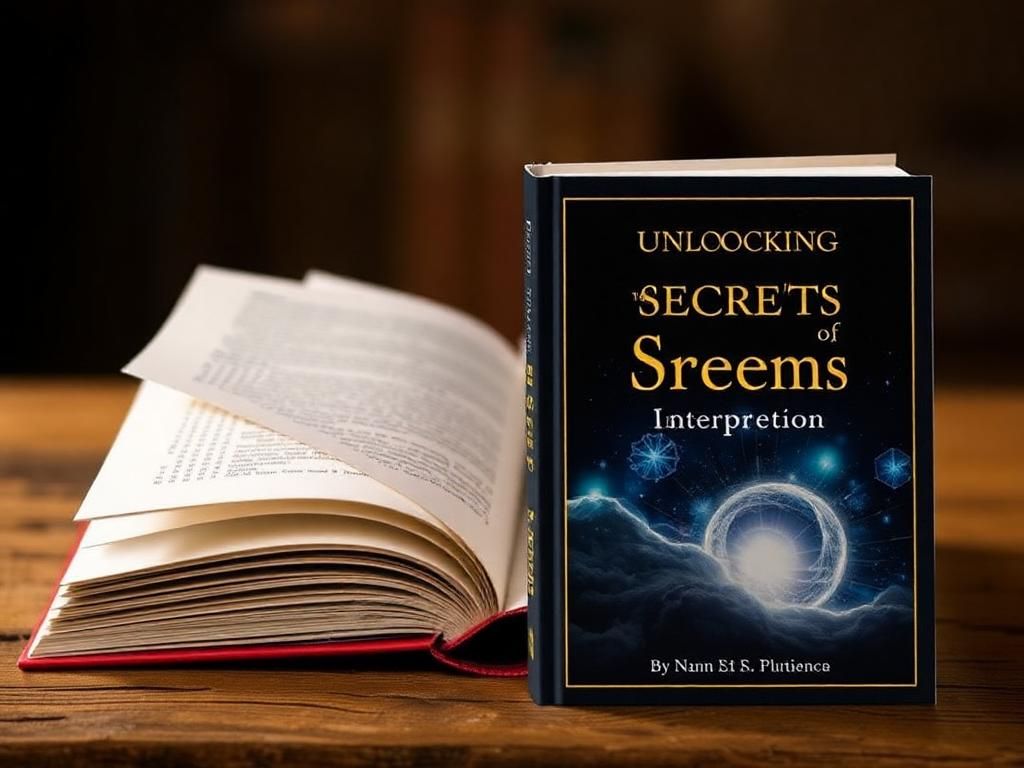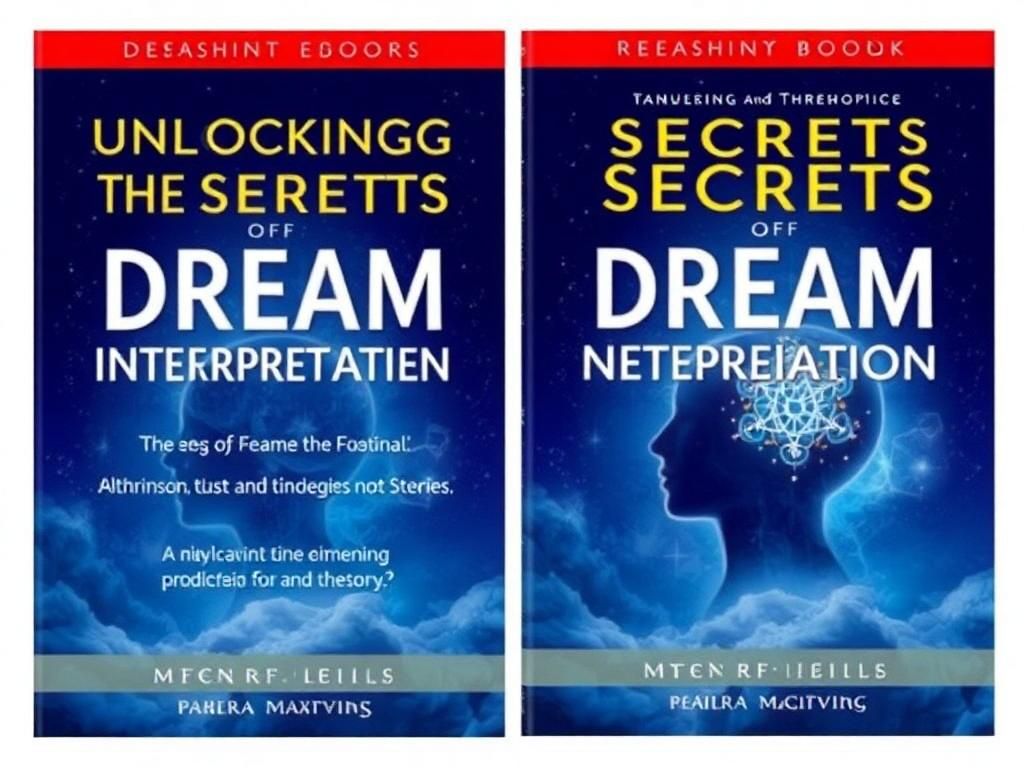Dreams have fascinated humanity for centuries, transcending cultures, beliefs, and epochs. They’ve been interpreted variously as prophetic visions, messages from the divine, or merely random brain activity during sleep. As such, the dream interpretation book serves as a valuable aid for those seeking to delve deeper into the mysteries of their subconscious. Understanding your dreams can lead to insights about your emotions, desires, and even unresolved conflicts in your waking life. This article will explore the significance of dreams, the different types of dream interpretation books available, notable classic and modern texts, and tips for choosing the right one for you.
Introduction to Dream Interpretation
The Significance of Dreams
Dreams have played a significant role throughout human history. From ancient civilizations using them for divination to modern psychology analyzing their content, dreams often reflect our innermost thoughts and desires. In many cultures, dreams are seen as omens or messages, prompting individuals to pay attention to their nightly visions. The persistence of dream interpretation across time reveals its importance in human psychology and cultural practices.
What is Dream Interpretation?
At its core, dream interpretation involves deciphering the content and meaning of dreams. It provides a pathway for individuals to understand their subconscious mind and the messages hidden within their dreams. The goal of this process could range from self-discovery to problem-solving. Various approaches, such as psychological, spiritual, and practical methods, can facilitate dream analysis, each offering unique insights and interpretations.
Types of Dream Interpretation Books
Psychological Approaches
Many dream interpretation books focus on psychological theories, particularly those of Sigmund Freud and Carl Jung.
– **Books focusing on Freud’s theories**: Freud regarded dreams as windows into our repressed thoughts and desires. For instance, in “The Interpretation of Dreams,” he emphasizes the symbolism of dreams and how they reveal our unconscious mind. An example interpretation might analyze a recurring dream of flying, suggesting a longing for freedom or escape from reality.
– **Jungian perspectives**: Jung introduced concepts of archetypes and the collective unconscious in dream analysis. His work emphasizes understanding symbols that transcend personal experiences. For example, dreaming of a wise old man might indicate a need for guidance, pulling from the archetype of the mentor.
Spiritual and Mystical Perspectives
Another category comprises books that tackle dreams from a spiritual angle.
– **Books related to dreams in spirituality**: These texts often connect dreams to other realms or divine messages, urging readers to explore their dreams for guidance and revelation. They propose that dreams can offer insights into one’s spiritual journey, offering a deeper layer for interpretation.
– **Cultural interpretations**: Various cultures have distinct methods for interpreting dreams, such as those in Native American and Indigenous practices. These dream interpretation books may pull from rich traditions that emphasize the significance of dreams within their cultural contexts.
Practical Guides
Practical guides stand out among dream interpretation books for their hands-on approach to personal analysis.
– A typical guide provides step-by-step methods for self-interpretation, including journaling and tracking dreams, which aids in recognizing patterns over time.
– Exercises and techniques can help individuals unlock the meanings of their dreams, facilitating a deeper connection with themselves.
Notable Dream Interpretation Books
Classic Texts
Several classic texts have significantly shaped dream interpretation.
– **”The Interpretation of Dreams” by Sigmund Freud**: This seminal work outlines key themes such as the role of dreams in satisfying desires. Its impact on psychology and culture is profound, laying the groundwork for understanding the complexities behind our dreams.
– **”Man and His Symbols” by Carl Jung**: This book explores core concepts, particularly those regarding symbols and their meanings, illustrating Jung’s approach to the symbolic language of the unconscious mind.
Modern Picks
Several contemporary books continue the tradition of dream analysis.
– **”The Complete Book of Dreams” by Lucy Ashford**: This modern resource combines aspects of psychological and spiritual interpretations, providing comprehensive coverage of common dreams and their meanings, alongside symbols that are influential in today’s context.

– **”Dreams Speak: A New Perspective on Dream Interpretation” by William D. Johnson**: The author’s approach offers a combination of psychological and spiritual insights, making it a unique addition to the collection. Readers praise it for its relatable language and actionable advice.
Specialty Books
Certain dream interpretation books concentrate on niche areas.
– **Dream dictionaries** provide straightforward definitions for common symbols, serving as handy reference guides for interpreting dream content.
– **Art and dream interpretation** explore the connections between these two realms, showing how dreams can inspire creative endeavors and vice versa.
– **Lucid dreaming** books allow readers to explore techniques for achieving control over their dreams, which can lead to deeper understanding and exploration of self.
How to Choose the Right Dream Interpretation Book
Choosing an appropriate dream interpretation book is crucial for a fulfilling experience.
Consider Your Purpose
Before selecting a book, understand your goals for interpretation. Are you seeking self-discovery, problem-solving, or creative inspiration? Defining your purpose can quickly narrow down your options. Moreover, evaluating personal beliefs regarding psychological versus spiritual interpretations can guide your choice.
Research Authors
The author’s background and expertise are critical in distinguishing valuable resources. Look for credible sources with endorsements from experts or respected figures in the field of psychology or spirituality. Why not browse websites like the American Psychological Association for trusted recommendations?
Types of Formats
Consider the format that fits your lifestyle. Print versions offer a tangible experience, while digital formats appeal to those constantly on the go. Some books have interactive elements, such as journals or mobile applications, that encourage tracking and recording dreams effectively.
Techniques for Dream Analysis
Implementing techniques for dream analysis can enrich your understanding of your dreams.
Keeping a Dream Journal
Journaling dreams provides numerous benefits, allowing for the documentation of patterns and themes over time. Effective dream journaling tips may include recording dreams immediately upon waking or developing a consistent format. Consider the following formats for journaling:
– Simple text entries
– Creative doodles reflecting emotional responses
– Charts tracking recurring symbols or emotions
Common Symbolism in Dreams
Understanding common symbols can facilitate decoding dreams effectively. For instance, a dream about water might symbolize emotions. Resources for decoding symbols include dictionaries or online databases focused on dream meanings. In literary case studies, various interpretations can be gleaned from famous dream sequences in literature, expanding our understanding.
Analyzing Emotional Content
One of the core elements of dream analysis is understanding the emotional content associated with dreams. Certain techniques can aid in emotional analysis, such as reflecting on feelings experienced during the dream and their potential links to real-life situations. Personal context significantly influences interpretation, showcasing the intricate bond between dreams and daily life.
Limitations and Misconceptions
Despite the intrigue surrounding dreams, several misconceptions exist.
Myths About Dream Interpretation
Common myths about dreams often cloud people’s understanding, such as the belief that all dreams carry hidden meanings. Clarifying the distinction between dreams and reality can demystify interpretations and promote healthier attitudes toward their significance.

The Subjectivity of Interpretation
Interpretation varies widely among individuals due to personal experiences, cultural backgrounds, and emotional states. Recognizing this subjectivity is vital when analyzing dreams, emphasizing the unique lens through which each person views the dream world.
Not Always a Clear Answer
Often, dreams consist of complexities, reflecting the intricate tapestry of human psychology. The exploratory nature of dream work means embracing uncertainty, encouraging a mindset of curiosity rather than one of fixed conclusions.
Conclusion
The Ongoing Journey of Dream Interpretation
Exploring dreams is an ongoing journey, one that invites individuals to unravel their thoughts and emotions. By diving into dream interpretation, readers can embark on a path toward personal growth, discovering new layers of understanding about themselves.
Final Thoughts
Finding the right dream interpretation book involves assessing individual preferences and purposes. Through dreams, we can gain profound insights into ourselves and our experiences in the world.
Additional Resources
Recommended Websites
Explore online forums and communities that focus on dream discussion and share experiences. Websites like the International Association for the Study of Dreams provide excellent resources and articles for further insights into dream analysis.
Apps for Dream Tracking
Several popular dream tracking apps can enhance your dream journaling experience. Features may include reminders for logging dreams, mood tracking, and symbol libraries, making digital journaling convenient and accessible.
Further Reading
For those eager to learn more, consider exploring articles on platforms like Psychology Today or related psychological and spiritual literature that delve deeper into various aspects of dream interpretation.
| Type of Dream Interpretation Book | Key Focus | Recommended Titles |
|---|---|---|
| Psychological Approaches | Freud’s and Jung’s theories | “The Interpretation of Dreams” – Freud, “Man and His Symbols” – Jung |
| Spiritual and Mystical Perspectives | Dreams as spiritual messages | Books on cultural interpretation |
| Practical Guides | Self-interpretation techniques | Various contemporary how-to guides |
| Specialty Books | Dream dictionaries, lucid dreaming | Selected niche texts |
FAQs
1. Why should I interpret my dreams?
Understanding dreams can provide valuable insights into our emotions and subconscious thoughts, enhancing self-awareness.
2. What if I can’t remember my dreams?
Practicing good sleep hygiene, keeping a dream journal, and setting intentions before sleep may help improve dream recall.
3. Are there universal symbols in dreams?
While some symbols may have universal meanings, interpretations often depend on personal context and experience.
4. How often should I analyze my dreams?
There is no set frequency; analyze dreams as they resonate with you or when you feel prompted to explore their meanings.
5. Can dreams predict the future?
While some believe that dreams can be prophetic, most psychologists view them as reflections of subconscious feelings rather than absolute predictions.
6. How do I start a dream journal?
Begin by writing down dreams as soon as you wake up. Create a simple format or use journaling prompts to dive deeper into meanings.
7. Do online resources exist for dream interpretation?
Yes, numerous websites and online communities offer resources, articles, and forums dedicated to dream interpretation discussions.
8. Can dream interpretation books be harmful?
While they generally provide valuable insights, interpreting dreams solely by rigid guidelines may limit personal exploration. Balance is essential.
9. Is it challenging to learn dream interpretation?
Learning dream interpretation may require practice and an open mind, but it can be a rewarding journey toward self-discovery.
10. Should I share my dreams with others?
Sharing dreams can lead to valuable discussions and insights, although it’s essential to choose trusted individuals for this exchange.
